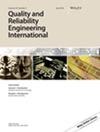将扫描统计数据纳入流程监控程序,监测产品表面缺陷
IF 2.8
3区 工程技术
Q3 ENGINEERING, INDUSTRIAL
引用次数: 0
摘要
在工业领域,监控恒定尺寸单位中的缺陷数量是一个定义明确的问题,控制图通常用于监控产品或产品样本中的缺陷总数。c 控制图假定基本缺陷数(单个或多个不同类型的缺陷)近似服从泊松分布,从而跟踪每种情况下的缺陷总数。当表面缺陷的数量引起人们的兴趣时,就会用到-图表来解决一类有趣的问题。虽然产品表面的缺陷数量是产品质量的表征,但缺陷在产品特定部位的集中程度尤为重要。在本文中,我们介绍了一种基于扫描的监测程序,它同时结合了用于监测缺陷数量(一般指事件)随时间变化的控制图和用于探索缺陷空间分布的扫描统计。数值说明显示,新程序在不同情况下都具有出色的性能。本文章由计算机程序翻译,如有差异,请以英文原文为准。
Monitoring defects on products' surface by incorporating scan statistics into process monitoring procedures
Monitoring the number of defects in constant‐size units is a well‐defined problem in the industrial domain and usually, the control chart is used for monitoring the total number of defects in a product or a sample of products. The c ‐chart tracks the total number of defects in each case by assuming that the underlying number of defects (single or several different types of defects) follows approximately the Poisson distribution. An interesting class of problems where the ‐chart is used is when the number of defects in a surface is of interest. Although the number of defects on the surface of products characterizes the quality of the products, it is especially important how concentrated the defects are in specific parts of the product. In this paper, we introduce a scan‐based monitoring procedure, which simultaneously combines control charts for monitoring the evolvement of the number of defects (in general, events) through time and scan statistics for exploring the spatial distribution of defects. The numerical illustration showed that the new procedure has excellent performance under different scenarios.
求助全文
通过发布文献求助,成功后即可免费获取论文全文。
去求助
来源期刊
CiteScore
4.90
自引率
21.70%
发文量
181
审稿时长
6 months
期刊介绍:
Quality and Reliability Engineering International is a journal devoted to practical engineering aspects of quality and reliability. A refereed technical journal published eight times per year, it covers the development and practical application of existing theoretical methods, research and industrial practices. Articles in the journal will be concerned with case studies, tutorial-type reviews and also with applications of new or well-known theory to the solution of actual quality and reliability problems in engineering.
Papers describing the use of mathematical and statistical tools to solve real life industrial problems are encouraged, provided that the emphasis is placed on practical applications and demonstrated case studies.
The scope of the journal is intended to include components, physics of failure, equipment and systems from the fields of electronic, electrical, mechanical and systems engineering. The areas of communications, aerospace, automotive, railways, shipboard equipment, control engineering and consumer products are all covered by the journal.
Quality and reliability of hardware as well as software are covered. Papers on software engineering and its impact on product quality and reliability are encouraged. The journal will also cover the management of quality and reliability in the engineering industry.
Special issues on a variety of key topics are published every year and contribute to the enhancement of Quality and Reliability Engineering International as a major reference in its field.

 求助内容:
求助内容: 应助结果提醒方式:
应助结果提醒方式:


